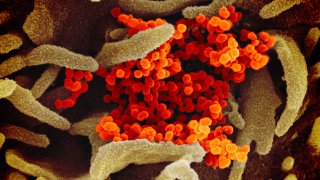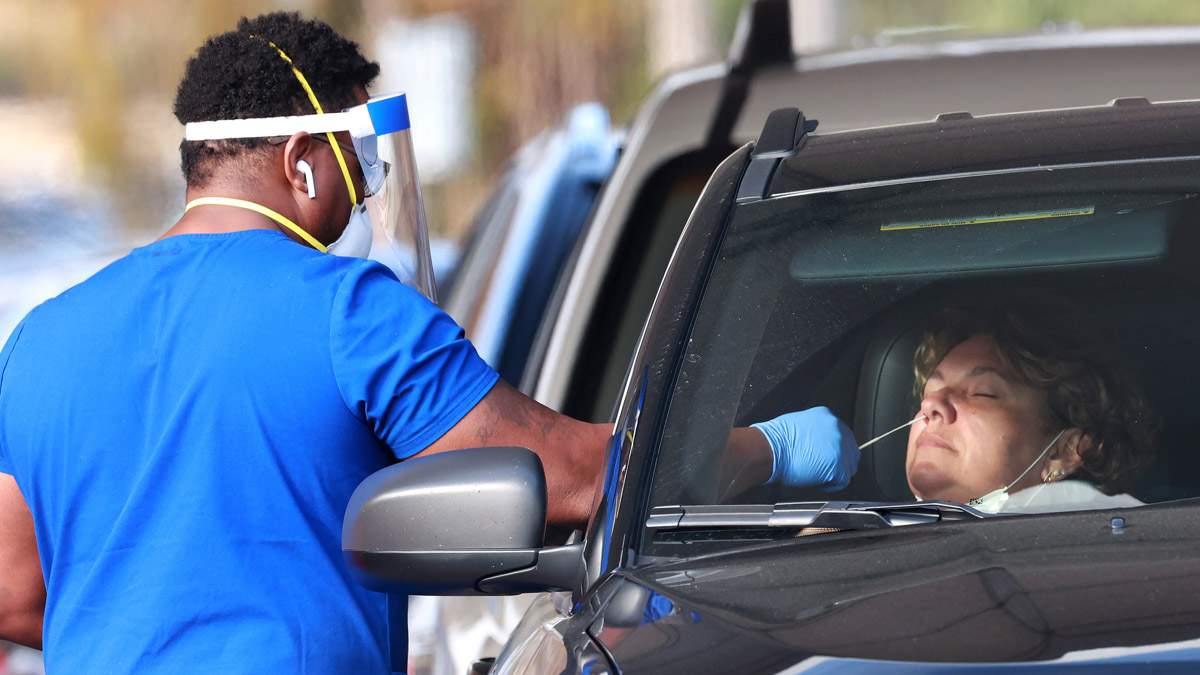
After briefly climbing back above 2,500 patients this week, the number of Texans hospitalized with COVID-19 dropped to lows not seen since June 2020.
In the last seven days, from May 8-14, statewide hospitalizations for people with COVID-19 peaked at 2,508 before dropping back Friday to 2,323. Meanwhile, the 7-day averages for new cases in the DFW Metroplex continue to drop.
Statewide, the Texas Department of State Health Services reported the rolling 7-day average of new confirmed cases dropped over the last week from roughly 1,800 on May 7 to approximately 1,600 on May 14. The 7-day average for the number of probable cases over the same time period decreased from roughly 590 to just over 500.
Got a question about the COVID-19 vaccine? Get the answers here in our FAQ.
Get DFW local news, weather forecasts and entertainment stories to your inbox. Sign up for NBC DFW newsletters.
On Friday, the state reported 61 more COVID-19 deaths, which is above the rolling 7-day average of 43 per day. A week ago, that 7-day average was 45.
The DSHS reported 2,323 hospitalized COVID-19 patients statewide Friday, a sharp decrease from the 2,568 patients reported seven days ago. The percentage of people hospitalized in TSA-E on Friday was 2.94%, a decrease of .29% from a week ago. The number of COVID-19 patients in DFW hospitals has bounced between 3.6% and 2.73% since March 27. After climbing for five straight days last week, the number of hospitalized patients in DFW's TSA-E decreased from 536 on May 10 to 479 on May 13.
County-specific details for Dallas, Tarrant, Denton, and Collin counties are below based on data reported between Saturday, May 8, and Friday, May 14, by county officials, local health departments, and the state health department.
Dallas County
In the last seven days, Dallas County reported 1,140 new and probable cases of the virus, an average of 163 per day. One week ago, the county was reporting an average of 212 new cases per day -- a month ago that average was 254 cases per day.
In the last seven days, Dallas County has also announced 47 deaths, an average of 7 deaths per day. One week ago, the county was reporting an average of 4 deaths per day -- a month ago that average was 14 deaths per day.
Since March 2020, the county has reported a total of 301,401 cases of the virus including 259,286 confirmed cases (PCR) and 42,115 probable cases (antigen). There have been 3,972 deaths attributed to the virus; there are currently an estimated 293,524 recoveries and, according to the DSHS, an estimated 3,755 active cases in the county.
Tarrant County
In the last seven days, Tarrant County reported 1,133 new and probable cases of the virus, an average of 162 per day. One week ago, the county was reporting an average of 169 new cases per day -- a month ago that average was 219 cases per day.
In the last seven days, Tarrant County has also announced 29 deaths, an average of 4 deaths per day. One week ago, the county was reporting an average of 4 deaths per day -- a month ago that average was 5 deaths per day.
Since March 2020, the county has reported a total of 259,092 cases of the virus including 217,228 confirmed cases (PCR) and 41,867 probable cases (antigen). There have been 3,467 deaths attributed to the virus; there are currently an estimated 251,907 recoveries and, according to the DSHS, an estimated 4,208 active cases in the county.
Denton County
In the last seven days, Denton County reported 482 new and probable cases of the virus, an average of 69 per day. One week ago, the county was reporting an average of 77 new cases per day -- a month ago that average was 87 cases per day.
In the last seven days, Denton County has also announced 41 deaths, an average of 6 deaths per day. One week ago, the county was reporting an average of 1 death per day.
Since March 2020, the county has reported a total of 75,364 cases of the virus including 55,387 confirmed cases (PCR) and 19,977 probable cases (antigen). There have been 536 deaths attributed to the virus; there are currently an estimated 71,533 recoveries leaving an estimated 3,295 active cases in the county.
Collin County
In the last seven days, the Texas Department of State Health Services reported 425 new and probable cases of the virus in Collin County, an average of 61 per day. One week ago, the county was reporting an average of 88 new cases per day -- a month ago that average was 106 cases per day.
In the last seven days, the DSHS has also announced 3 deaths in Collin County, an average of .43 deaths per day. One week ago, the county was also reporting an average of 1.3 deaths per day -- a month ago that average was 1.14 deaths per day.
Since March 2020, the DSHS has reported a total of 90,826 cases of the virus in the county including 74,621 confirmed cases (PCR) and 16,205 probable cases (antigen). There have been 831 deaths attributed to the virus; there are currently an estimated 90,253 recoveries and, according to the DSHS, an estimated 573 active cases in the county.
COVID-19 Latest
COVID-19 Vaccines
In Texas, the COVID-19 vaccines are currently available to anyone over the age of 5. The vaccines are still not approved for children younger than 5 however -- those trials are ongoing.
Once vaccinated, people who received either the Moderna or Pfizer vaccines are expected to get some level of protection within a couple of weeks after the first shot, but full protection may not happen until a couple of weeks after the second shot. For those who receive the Johnson & Johnson vaccine -- there is only one shot needed.
As of Jan. 3, 2022, it is also recommended those who are age 12 and up and who have been fully vaccinated receive a booster as early as five months after their last dose, for a total of three shots. The vaccine made by Pfizer and its partner BioNTech is the only U.S. option for children of any age.
As for even younger children, kid-size doses for 5- to 11-year-olds rolled out in November and experts said healthy youngsters should be protected after their second dose for a while. But the FDA also said on Jan. 3, 2022, that if children that young have severely weakened immune systems, they will be allowed a third dose 28 days after their second. That’s the same third-dose timing already recommended for immune-compromised teens and adults.
Pfizer and Moderna are studying their vaccines, in even smaller doses, for children younger than 5.
Even when fully vaccinated, it's still possible to become infected by the virus since none of the vaccines offer 100% protection from infection. With that in mind, even if you've been vaccinated it's still a good idea to wear a mask and keep some separation between strangers or those whose vaccination status is unclear.


